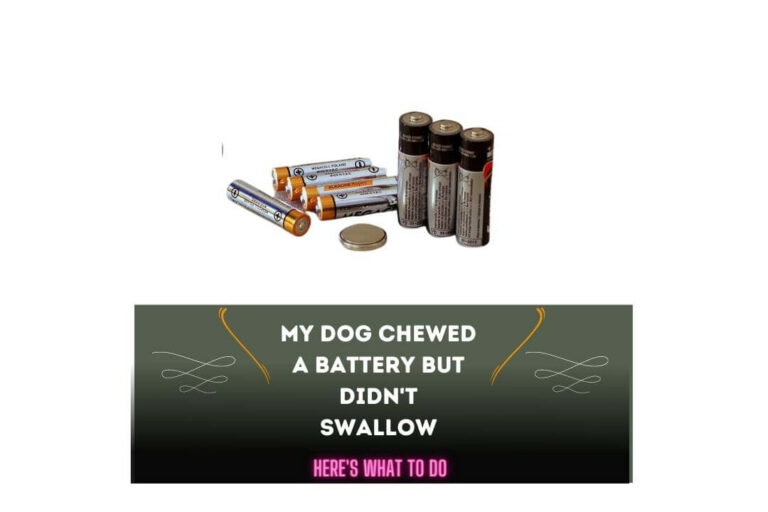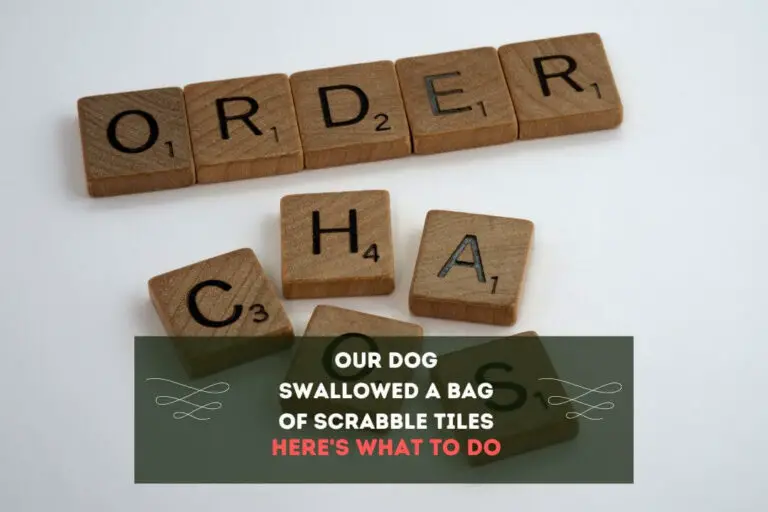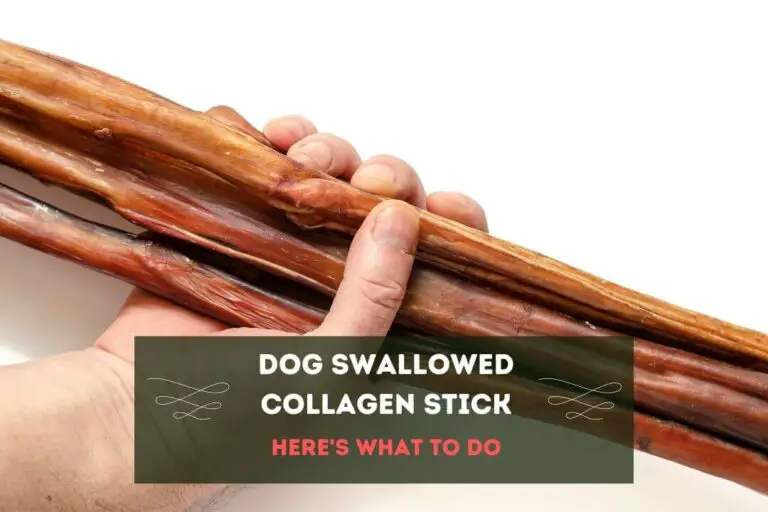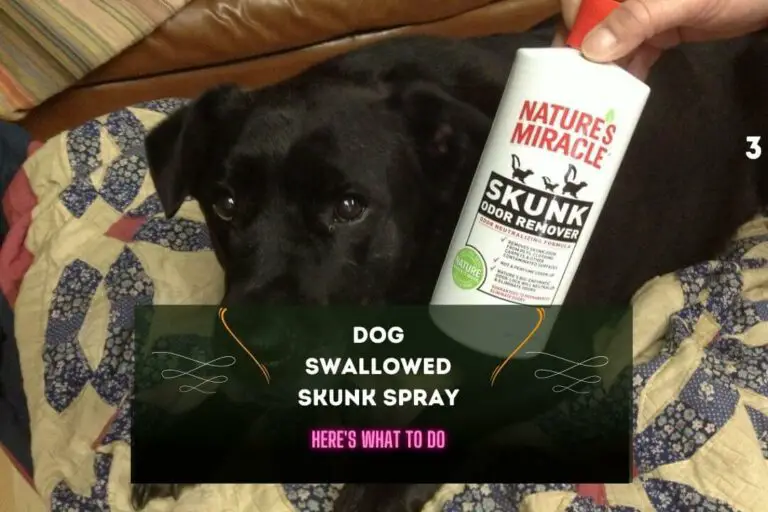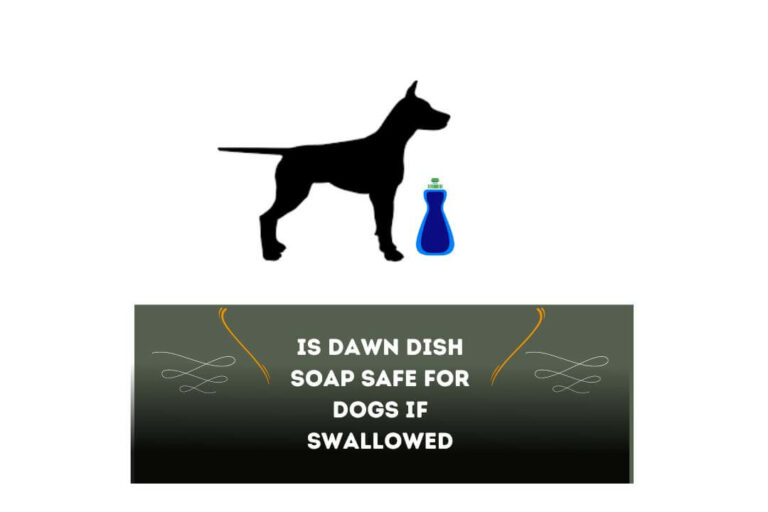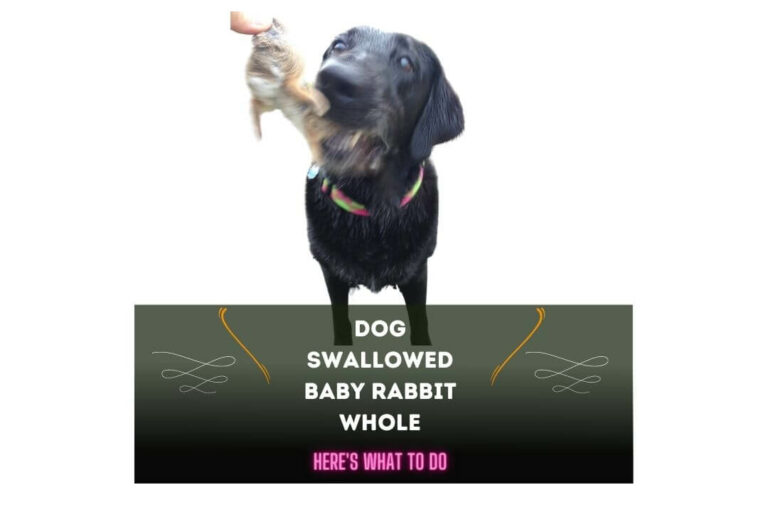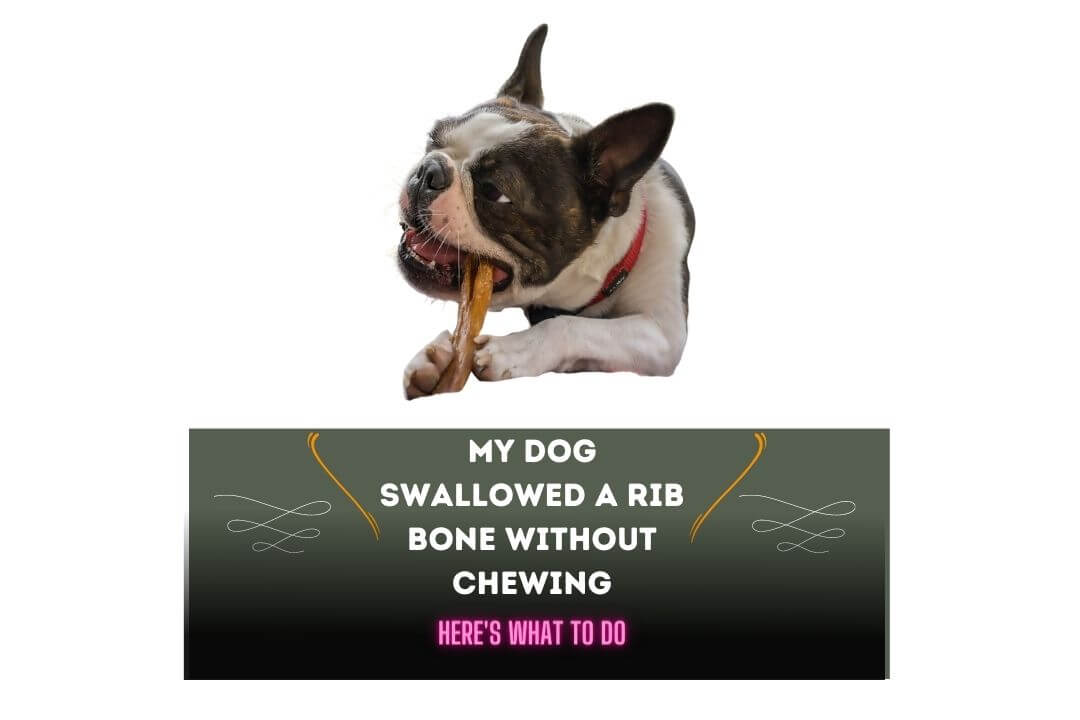
If you want to know what I should do if my dog swallowed a rib bone without chewing, this article is for you. Since all types of dogs have a tendency and Instinct to gnaw or chew on something, it can sometimes lead to Swallowing bone whole without chewing it.
Here I will discuss five immediate steps you need to follow to keep your dog healthy, safe and prevent further complications. Rib bones are particularly concerning, as they can easily splinter and cause damage to your dog’s digestive tract.
In this article, I’ll help you learn the potential risks and symptoms of a dog swallowing a rib bone, along with tips on what you should do about it.
What Happens When A Dog Swallows A Rib Bone
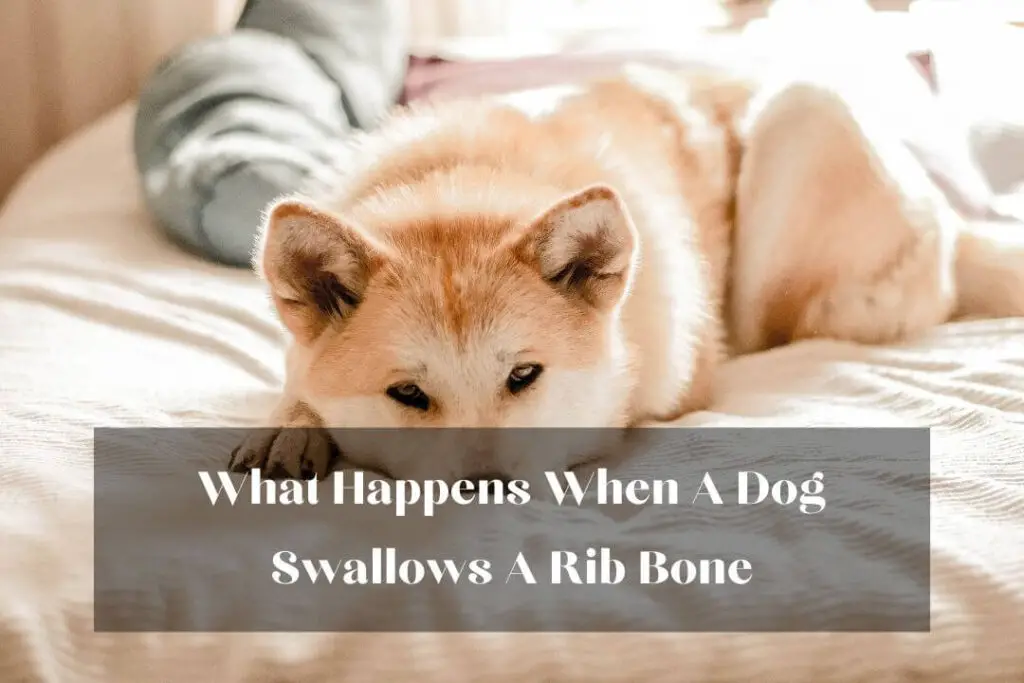
Choking or Blockage Of the Airway
One of the most immediate and serious risks of a dog swallowing a rib bone is choking or airway blockage. If your dog has swallowed a rib bone without chewing, it can get lodged in its throat or windpipe, preventing your furry friend from breathing properly. This can also happen if your Dog Swallowed Baby Rabbit Whole.
In rare cases, a veterinarian will recommend you go with the surgery or manually remove the bone to restore the proper breathing of your dog.
Gastrointestinal Blockage
Another common issue your dog will likely experience after swallowing rib bones without chewing is a gastrointestinal blockage. If the bone has stuck in your dog’s digestive tract, it will cause a blockage, further preventing the food from passing through. This can also happen if your Dog Swallowed a Beef Bone Without Chewing.
This may lead to the dog experiencing severe abdominal pain and vomiting, and dehydration symptoms.
If this is the case, you need to contact your veterinarian immediately and let them know about the current situation for proper guidance on what you should be doing. In rare cases, a vet may recommend emergency surgery to remove the blockage from your dog’s digestive tract.
Perforation or Damage To The Digestive Tract
Experts always advise excluding bones from a dog diet as it poses a risk. In particular, rib bones are very dangerous because they can splinter easily, causing wear and tear in your dog’s digestive tract.
If the rib bone splinters or breaks into sharp pieces, it may start to puncture or damage your dog’s digestive tract as it moves through the system. This will not only lead to internal bleeding, but also, it may cause infection and other serious complications requiring medical intervention.
Infections or Bacterial Growth
If you think your dog has swallowed a rib bone without chewing it, you should contact your veterinarian immediately, as it shouldn’t be stuck in your dog’s digestive tract for an extended amount of time.
If a rib bone gets stuck in your dog’s digestive tract for an extended amount of time, it will lead to bacterial growth and infections. This becomes particularly true when the bone has already caused damage to your dog’s digestive tract or punctured any organs.
Therefore, if you notice any signs of infection like fever, lethargy, or loss of appetite in your dog, you need to contact your veterinarian and get your dog checked at the nearest clinic as soon as possible for proper diagnosis & treatment.
Risks of Surgery
If your dog shows any unusual symptoms or the signs I have discussed in the above section after swallowing a rib bone, surgery may be required to remove the bone and repair any damage. Even though surgery is considered generally safe, there are always risks associated with your dog with anesthesia and invasive procedures.
5 Symptoms to Look Out For
As I told you earlier, you should always pay attention to your dog’s movement and watch out for unusual symptoms. If you are dog has swallowed a rib bone without chewing, it is likely to exhibit the following symptoms:
- Difficulty breathing
- Coughing or gagging
- Vomiting or retching
- Diarrhea or constipation
- Loss of appetite
- Abdominal pain or swelling
Note: You must pay attention to these symptoms and seek veterinary care immediately if your dog exhibits any of the above signs. The earlier you detect the problem, the better your chances of a successful outcome for your dog to keep them healthy, safe, and Happy all life long.
My Dog Swallowed A Rib Bone Without Chewing: 5 Immediate Steps To Take
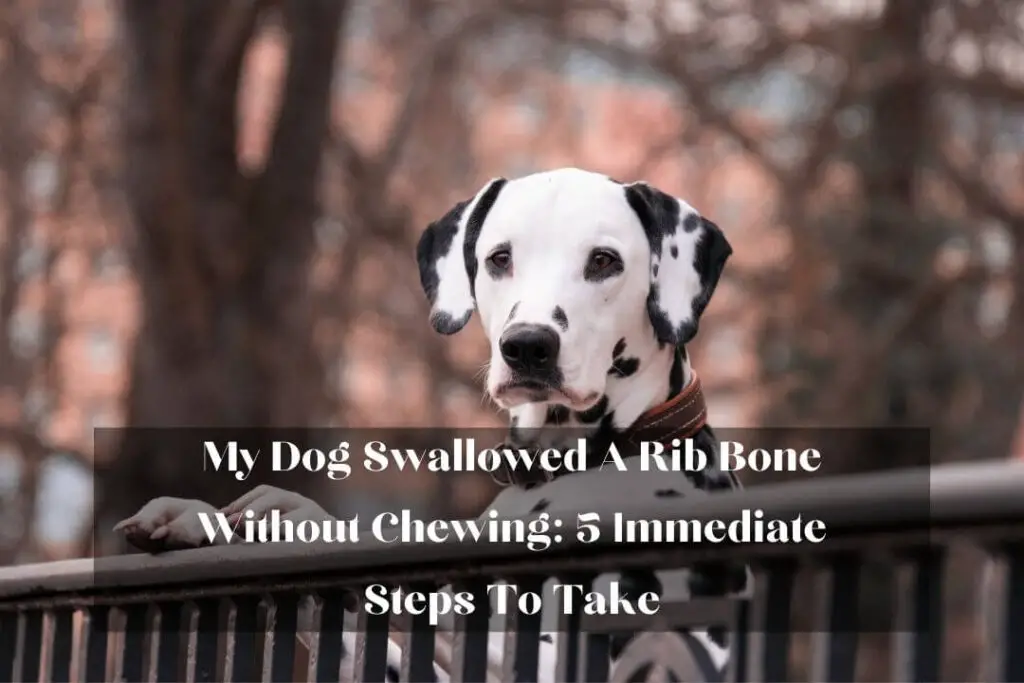
Stay Calm And Assess The Situation
The very first thing that you need to do is to remain calm and assess the situation. It would help if you never panicked, as it will only worsen the situation, and your dog may become stressed or anxious because of your reaction.
Firstly, I recommend you take a deep breath and closely observe your dog’s movements & behavior closely. While monitoring, if you notice any symptoms of distress in your dog, you should contact your veterinarian.
The possible signs of distress that you are likely to notice after your dog swallows a rib bone without chewing include gagging, vomiting, or coughing. Thus, it would help if you acted quickly.
- Call Your Veterinarian Immediately
After you’ve assessed the situation, the second thing you need to do is to call your veterinarian immediately. According to a study published in the Journal of Veterinary Medical Science, ingesting bone is a common problem among dogs.
Before you panic and ask for an immediate solution, you should explain the current situation and let them know your dog’s condition, age & size. After that, you need to follow your veterinarian’s instructions.
Your veterinarian may advise you to bring your dog in for an emergency examination or ask you to monitor your dog’s behavior for the next few hours. On the other hand, if you cannot call your veterinarian, you can take your dog to the nearest animal care clinic or vet clinic for proper diagnosis & treatment.
Follow Your Veterinarian’s Instructions
Depending upon your dog’s current situation, your veterinarian may advise you to induce vomiting or give your dog medication to ease up the symptoms and rule out the possibility of further complications.
They may also advise you to monitor your dog’s behavior closely or hospitalize it for a few days. It would help if you never attempted any treatment for your dog without taking proper veterinary advice.
You must follow your vet’s instructions carefully. Many people try to induce vomiting, which can be dangerous and not always recommended. According to the American veterinary medical association, inducing vomiting using any medication like Ropinirole should always be done under a veterinarian’s or experts’ supervision.
In addition, if the bone has already passed through the stomach, inducing vomiting may cause the bone to become stuck in your dog’s esophagus, leading to further complications.
Do Not Induce Vomiting Or Give Any Medication Without Veterinary Advice
As I mentioned, you should never attempt to induce vomiting or give any medication without proper veterinary advice. Also, certain medications are known to be toxic to dogs, and inducing vomiting will do nothing but cause further complications.
7 Signs That Indicate Medical Attention Is Needed:
- Gagging or retching
- Vomiting
- Coughing
- Loss of appetite
- Abdominal pain or bloating
- Constipation or diarrhea
- Lethargy or weakness
- Difficulty breathing
Do Not Offer Any Food Until Your Vet Advice
If your veterinarian is unavailable, you should seek emergency veterinary care immediately. Time is of the essence when you’re dealing with foreign body ingestion. You should note that delaying treatment will only lead to further complications.
Plus, a few factors can affect the severity of the issue. When you’re visiting the vet clinic with your pet, you must consider the following factors:
- Size and type of bone ingested
- Age and size of the dog
- Pre-existing medical conditions
- Symptoms exhibited by the dog
- Severity Of The Issue
How To Prevent Your Dog From Swallowing Bones
Supervise Your Dog When They’re Chewing
When you offer any bones to your dog, you must supervise them and keep an eye on them. You should always remove small or broken pieces of bones that your dog may try to swallow.
Not only this, but you should also keep proper supervision of your dog when playing with its chew toy. It is best to offer bones or toys appropriate for your dog’s size & chewing habits.
Keep Bones Out Of Reach
Since Dogs are opportunistic, you should keep them from roaming around the kitchen, countertops, and trash. They can try to sneak bones while you are busy or not paying attention. It would help to keep bones and other dangerous objects out of reach. Also, you must dispose of them properly in a sealed trash can.
Offer Safe Chew Alternatives
If your dog has a poor habit of chewing on things, you should go with the alternatives of bones, like chew toys or chew treats. There are many types of safe chew alternatives that you can use instead of bones.
I usually prefer to use rubber toys or chew treats to keep my dog busy and prevent it from chewing on my things. There are tons of chew toys that can help you satisfy your dog’s natural urge to chew through.
Plus, these options are great as they are less likely to break or splinter. On the other hand, consider offering dental chews, which will promote healthy teeth & gum in dogs. A study published in the Journal of Veterinary Dentistry says dental chews can help reduce plaque & tartar buildup in dogs.
Train Your Dog
Another thing that you must consider is to teach your dog the ‘leave its command. Training your dog to drop and leave an object is an effective solution to prevent them from swallowing any dangerous item or object likely to cause complications & health risks. It would help if you considered using positive reinforcement techniques like clicker training, which is proven very effective in teaching your dog new behaviors.
- Regular Checkups
You should always pay a quick visit for periodic testing on your dog’s health to assess any underlying health issues that may increase the risk of foreign body ingestion. You must seek veterinary advice and recommendations for an appropriate diet & supplements that can promote a healthy digestive system while reducing the risk of intestinal blockages.
- Related Issue That Are Frequently Reported
- Our Dog Swallowed A Bag Of Scrabble Tiles: What To Do
- My Dog is Addicted to Bully Sticks: 5 Reasons
- Dog Swallowed Collagen Stick: Here’s What To Do
Conclusion
After reading this article, I hope you know what you need to do if a dog swallows a rib bone without chewing. You must remain calm and seek veterinary assistance immediately. Also, make sure you’re adhering to & following your veterinarian’s instructions carefully.
As I told you earlier, you should consider teaching your dog the ‘leave it’ command because prevention is key to keeping a dog safe and healthy for life. Also, avoid inducing vomiting without veterinary supervision and avoid giving any medication without professional advice.
After reading this article, you know the steps to keep your friends safe and healthy. If you find the article helpful, then consider sharing it. Your share will help many people learn about the possible risks & complications of rib bone ingestion in dogs.
Do check our other articles on dog-eating problems and solutions. See you in the next post, till then, take care and goodbye.

